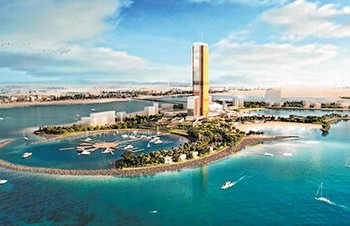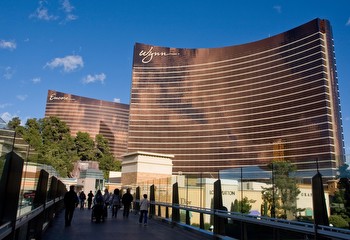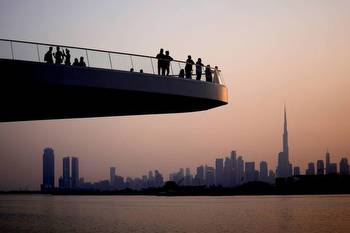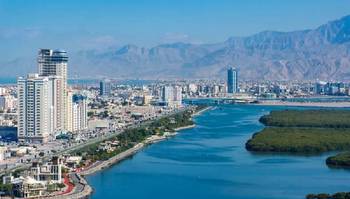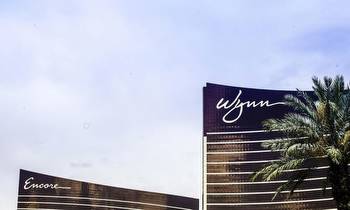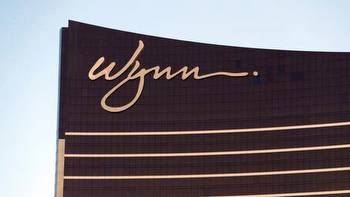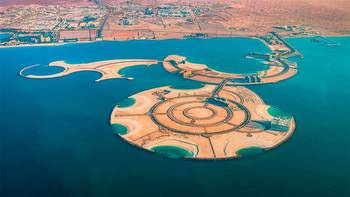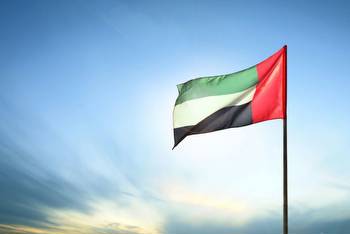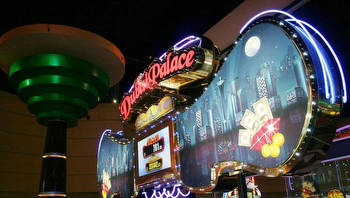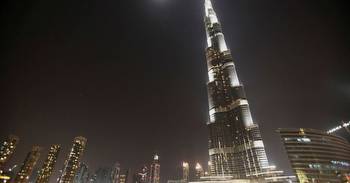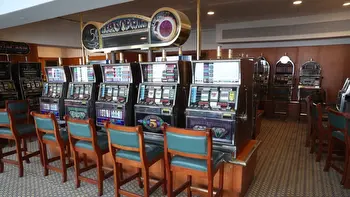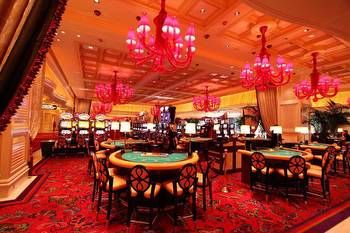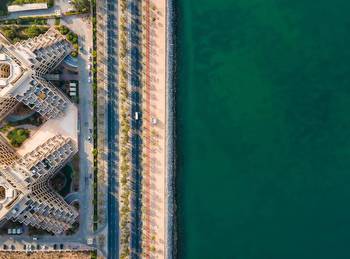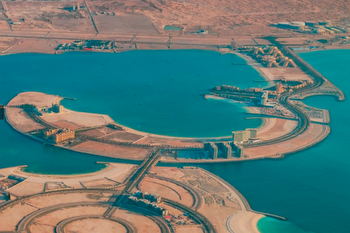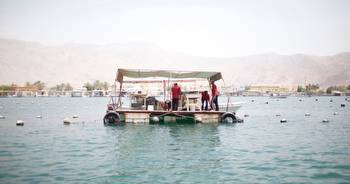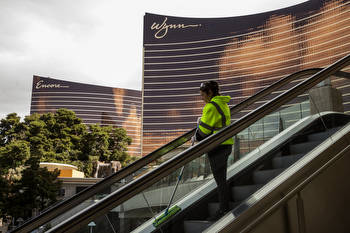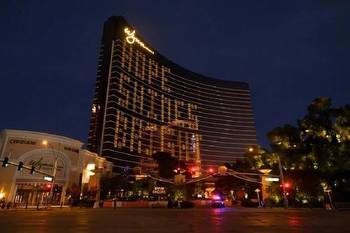Gambling has long been taboo in Islamic countries. Now, analysts see UAE as the next Vegas
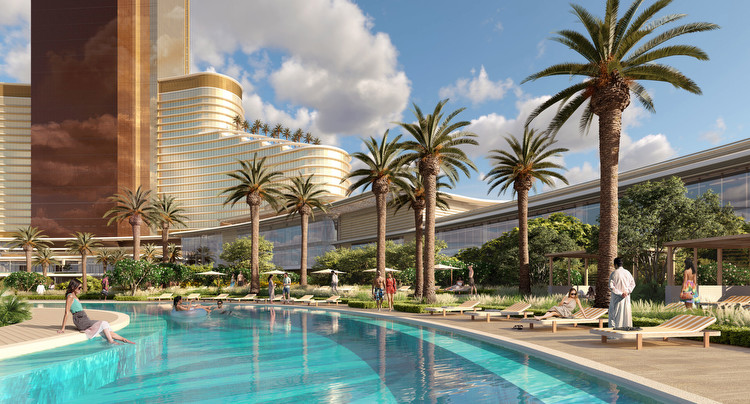
The United Arab Emirates, a country where almost three-quarters of its population adheres to Islam — a religion that considers gambling a harmful activity — could one day surpass Las Vegas as one of the world’s most lucrative casino markets.
Despite a gaming ban throughout the Middle East, UAE is creating a gaming regulatory system allowing each of its seven emirates to have at least one integrated resort — a property that includes a casino, hotel rooms, restaurants, entertainment and non-gaming attractions.
One development is already under construction. Wynn Resorts is building a $3.9 billion integrated resort, first announced in 2022, on the man-made Al Marjan Island in Ras Al Khaimah. At least two other emirates — Dubai and Abu Dhabi — are targeted for a casino resort.
Those three properties alone, according to gaming advisory firm CBRE Institutional Research, could produce as much as $8.6 billion in annual gaming revenue. That’s more than the $8.4 billion in gaming revenue produced in 2023 by the 25 properties that make up a major portion of the Las Vegas Strip, according to Gaming Control Board Senior Economic Analyst Michael Lawton.
“We believe the UAE represents one of the most compelling opportunities in global gaming,” CBRE analysts John DeCree and Colin Mansfield wrote in a research report last week. They led a team of CBRE analysts during a weeklong visit to the UAE in early May to gain an understanding of the market.
As with other international gaming jurisdictions, Mansfield said casinos in the UAE would create an untapped market of high-end Middle Eastern customers, providing Strip resorts with another visitor base to populate their ultra-luxury gaming lounges, restaurants and other attractions.
“[The UAE] is a way to expand your brand's global reach with a new market that’s potentially never seen or visited Las Vegas,” Mansfield said in an interview with The Nevada Independent. “We like the financial aspect of diversifying cash flows.”
DeCree said the UAE, given the luxury hotels and restaurants that already populate Abu Dhabi and Dubai, could eventually have a character similar to Las Vegas, which has become dominated by non-gaming spending that often reaches 65 percent of the total revenue stream.
“I think it is reasonable to expect the UAE will be the Las Vegas of the Middle East,” DeCree said.
The UAE already has an existing tourism industry with some 200,000 hotel rooms. DeCree said the emirates offer “a high propensity for luxury and consumer spending, a business-friendly operating environment, strong existing transportation and lodging infrastructure, and virtually no gaming competition.”
DeCree said he expects the market to have some similarities to Singapore, which has two integrated resorts operated by Las Vegas Sands and Malaysia-based Genting Group in which 40 percent of the revenue comes from non-gaming activities.
Combined, Singapore's two casinos accounted for $3.4 billion in gaming revenue in 2023.
The first step in the process will be for the UAE to end its ban on gaming. The analysts expect a regulated casino market would follow a similar roadmap the UAE took in relaxing rules in 2020 that previously prohibited activities such as alcohol consumption by non-Muslims.
Gaming would be decriminalized through a federal decree or legislative changes to the criminal and penal code.
“We anticipate these legislative changes to be forthcoming in the next few months,” CBRE wrote, suggesting the action in the region that is often shrouded in mystery may have been already signed but not published. “We wouldn’t necessarily expect a very public announcement.”
UAE’s regulatory structure is still a work in progress some 10 months after the General Commercial Gaming Regulatory Authority (GCGRA) was established with former MGM Resorts chairman and CEO Jim Murren overseeing the agency’s board and former Missouri gaming regulator Kevin Mullally as CEO.
Murren told The Nevada Independent last fall he could not comment about the process and Mansfield said CBRE couldn’t disclose who they met with in the UAE. In the report, the analysts wrote, “We foresee an operator-friendly framework” for the GCGRA.
“Everyone had been publicly restrained [from commenting] and we’ve been following [UAE] media, which fueled our thesis around what we think the regulatory structure could look like,” Mansfield said.
Kicking the tires
Most of the major international gaming operators are already exploring the UAE’s potential, hoping to land one of the potential integrated resort licenses.
“Everyone is going to kick the tires,” Mansfield said. “The UAE is a compelling opportunity.”
Wynn is beyond the tire-kicking stage. A planned 1,000-foot-tall hotel tower is already rising above the shoreline next to the Arabian Sea. The future casino will encompass just 4 percent of the property’s overall footprint of 5.6 million square feet.
Wynn Al Marjan will have 1,542 hotel rooms and suites and 22 high-priced villas with beachfront access, 22 restaurants and lounges and retail and meeting spaces.
“Wynn Al Marjan Island should generate strong returns, high property margins, and a greater non-gaming mix than Macau and even potentially Singapore integrated resorts,” CBRE wrote.
Wynn was “handpicked” by the Ras Al Khaimah emirate to develop and operate the resort. However, the regulatory framework the emirate created has now been superseded by the GCGRA.
“Although some investors remain cautious on the licensing process, we would argue that Wynn Al Marjan Island is too big, or too important, to fail,” CBRE wrote in the report. “Since the Wynn project was announced in 2022, the broader Al Marjan Island master plan accelerated, attracting significant investment to the region.”
Among the companies CBRE suggested would have an interest in the UAE are Las Vegas Sands, Hong Kong-based Galaxy Entertainment and Melco Resorts, Genting Group and Florida-based Hard Rock International.
MGM Resorts International is already in Dubai, partnering with Wasl Asset Management Group on a 25-acre non-gaming resort development on Jumeirah Beach, one of the emirate’s man-made islands. The $1.2 billion project includes three hotel towers totaling 1,500 rooms and will be branded under the Aria, MGM Grand and Bellagio names.
MGM Resorts CEO Bill Hornbuckle said last September that a 150,000-square-foot space is being created on the site for one of two amenities — either a casino or retail center. He said MGM’s involvement in the project happened long before gaming discussions ever began.
“The UAE is a fascinating opportunity,” Hornbuckle said.
In the report, DeCree and Mansfield wrote the island would be one of the stronger locations for gaming, given the neighborhood includes the Burj Al Arab Hotel, which was designed to resemble a sailboat; Dubai International Financial Center and the Palm Jumeirah man-made island.
CBRE predicted a single gaming license in Dubai could produce more than $2.8 billion in gaming revenue.
“We suspect Dubai could support two [gaming licenses] that could potentially rival Singapore given the amount of visitation, tourism, wealth, and population,” the analysts wrote.
Caesars Entertainment has taken itself out of the UAE market. In November, the company ended its affiliation with a non-gaming hotel and resort in Dubai that began in 2018.
After selling its stake in a potential South Korean venture in 2023, Caesars CEO Tom Reeg said the company was no longer interested in international casino operations beyond its Caesars-branded hotel-casino in Windsor, Ontario, Canada.
Yas Island in Abu Dhabi, where tourism is already a strong focus, is the unspoken-for location being touted by the analysts in the report.
The 15-square-mile island includes several theme parks, including SeaWorld and Warner Bros. World, an 18,000-seat sports arena, a race course for the FormulaOne Abu Dhabi Grand Prix, a 2.5 million-square-foot retail mall and a waterfront development with more than 20 food and beverage outlets.
Although MGM Resorts has expressed some interest, “There is no clear front runner for an integrated resort operator in Abu Dhabi, should the emirate move forward with licensing,” the analysts wrote. “We suspect just about any other global [integrated resort] operator could be interested given the potential size of the opportunity.”
First roll of the dice
DeCree said the UAE is moving faster toward implementing and developing a gaming market than any other nation.
He cited Japan as an example where casinos were discussed in the early 2010s as a way of using the tax revenue to fund the infrastructure needed for the 2020 Summer Olympic Games in Tokyo.
However, long before the pandemic pushed the Olympics into 2021, most of the major U.S. gaming operators departed the bidding process.
Nearly two decades after the process began, MGM Resorts plans to open Japan’s first casino resort — a $10 billion project in Osaka — in 2030. If the Wynn Al Marjan remains on schedule for a 2027 opening, the UAE could have the Middle East’s first gaming development three years ahead of Japan.
“We looked at some other jurisdictions, and it takes a very long time to go from studying gaming to debating what the regulatory structure should look like, to licensing, implementation and execution,” DeCree said.
The analysts experienced how quickly the UAE is evolving.
“We've seen a country that is very focused on investing and maintaining its leadership position in global tourism and as a financial hub,” DeCree said.”








